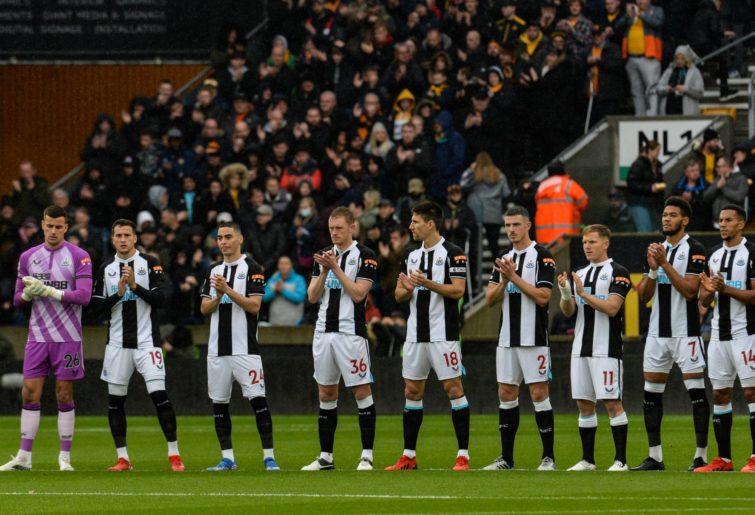Is the writing on the wall for Eddie Howe?
Newcastle United were predictably knocked out of the FA Cup by Manchester City at the quarter-final stage, ending any chance of Eddie Howe’s side…
Opinion
To say that life as a Newcastle fan is interesting at the moment is as much of an understatement as the observation that “there’s a little bit of oil in them Saudi Arabian sand dunes”.
In the span of mere days, sentiment among Toon fans has done a complete 180 from the preceding dread at the impending rot leading to prolonged obscurity in the lower tiers (aka “doing a Sunderland”).
When the Freddy Shepard reign came to an end as Mike Ashley purchased the club back in 2007, there was a general sense of relief given the rollercoaster relationship between Shepard and the fans during the “share market ownership” era.
As hard as it is to imagine now, Mike Ashley actually endeared himself quite well to Newcastle fans by bringing back a certain Kevin Keegan of the ’90s “Entertainers” fame.
The relationship between Ashley and Keegan, though – like many other relationships – soured and the Newcastle United who were still basking in the slight afterglow and prestige of the high flying Sir Bobby Robson years diminished.
Years of top-tier infrastructure development from training facilities and stadium expansion off the pitch at the turn of the millennium to go with UEFA Champions League football and top-four finishes on the pitch became a distant memory and Newcastle slid down the table and were in the once unthinkable challenges of relegation.

(Photo by Serena Taylor/Newcastle United via Getty Images)
The consternation of Newcastle fans during the Ashley era was not merely a matter of neglect or stinginess, though.
It was the rubbing of salt into the proverbial wound through the outright disrespect of attempting to change the hallowed name of the Stadium from St James Park to Sports Direct Arena in an ill-conceived attempt to copy the commercialised Stadium naming rights of the new Emirates or Etihad Stadium.
Half of the elation of Newcastle fans, then, is having belatedly escaped the perceived abusive relationship with Ashley.
This palpable sense of relief is merely added to through the delight that in the globalised era of football the club has been bought by a consortium consisting of local ambitious entrepreneurial drive as reflected through Amanda Staveley’s persistent involvement.
Newcastle United have been the sleeping giant of football. It is a debt-free, one-team city unlike London of course, but also the duopolist Manchester or Liverpool, for example.
This ensures local monopoly over an already resilient fan-base with proven staying power as high attendance figures in the Championship attests.
Stavely’s PCP partners and the Reuben brothers, combined with the involvement of none other than “the biggest Sheikh of all” in the guise of the Saudi Public Investment Fund (PIF) has simply added to the elation.
In terms of motive and intent, it appears that Newcastle United are playing a fundamental role as a marketing lynchpin in the Saudi “Vision 2030” vision dedicated to diversifying the economy away from oil.
The acquisition of Newcastle United can be considered a followup to listing 5 per cent of PIF chief asset Saudi Aramco on the stock market in an IPO.
This could further involve Saudi Arabia following UAE and Qatari footsteps in launching an Etihad or Emirates-style airline.
This author suspects the PIF will go further and throw their hate into the realm of acquiring a prominent sports broadcaster as a Saudi equivalency to Bein Sports – after all, part of the reason for the delay revolved around broadcast rights in the Saudi kingdom.
There could be additional interest in building its own network of clubs, akin to the City group (watch this space, Newcastle United Jets fans?) and the acquisition of Newcastle makes further sense from simple marketing terms when we consider the distinctiveness of the black and white stripes kit scheme.
For example, Manchester United, Liverpool and Arsenal are all shades of red. Manchester City, Chelsea are each in their own way the Blues etc, which equates to obstruction in brand recognition.
This may seem an odd tangent initially but there is no mistaking what club a fan wearing black and white stripes is following, which an AFL fan would recognise has been to Collingwood’s benefit.
Newcastle fans then can perhaps feel assured that unlike the previous owner, the new owners are very much committed to following through with institution building and honouring the team’s potential from the academy and training facilities upwards.
Much of the football related media space in the aftermath has been dedicated to the surreal experience of Newcastle being linked to myriad out-of-favour, world-class stars for the January transfer window.
In reality, higher on the ‘to-do list’ before any players are even considered is the management side of the equation with the likes of Luis Campo and Ralf Rangnick linked to the sporting director role.
Additionally, of course, there is much speculation about “Ashley era holdover” Steve Bruce being replaced as manager with the unattached Lucian Favre or Antonio Conte looking the simpler option.
And the January transfer window is set to be more intriguing than normal given Newcastle’s accounting situation already allows for expenditure in the region of £200 million.
Current relegation position aside, Newcastle will speedily be looking to make the current ‘top six’ into the ‘magnificent seven’ in a major shake-up of the English Premier League power dynamic.